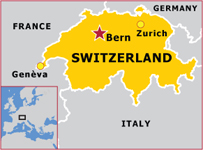
Switzerland Overview
Small, mountainous and wealthy, with a population of just seven million. Switzerland is renowned for its enviable quality of life in a country that ticks along like clockwork. Its products are sought after the world over, from dangerously delicious cheese and chocolate to luxurious watches whose timekeeping is as sharp as a Swiss army knife, another popular export from this clever little nation in the Alps. Switzerland’s famed political neutrality and isolated location, ring-fenced by mountains, have enabled it to play a safe but central role in European affairs. These factors also gave rise to the coveted Swiss bank account, whose anonymity, along with tax relief and what may be the safest banks in the world, have made Zurich one of Europe’s major financial hubs. The conveniently central location in the middle of Europe has also made Switzerland a favorite meeting place for conventions and international conferences – Geneva, for instance, is home to the United Nations. Switzerland is not only a place for professionals, though. As a stylish tourist destination it offers top ski resorts like Zermatt and celebrity-studded St. Moritz, while the white peaks of mountains set against blue skies make a wonderful backdrop for summertime hiking. The ancient capital of Bern provides opportunities for sightseeing and elegant shopping, while nightlife can prove to be a lot of fun, too, since the Swiss like their food and folk music even in discotheques and nightclubs.
General Information
Area: 41,285 sq km (15,94 sq miles)
Population: 7,261,210
Capital: Bern
Geography: Switzerland is bordered by France to the west, Germany to the north, Austria to the east and Italy to the south. It has the highest mountains in Europe, waterfalls and lakes set amid green pastures and the spring Alpine flowers covering the valleys and lower mountain slopes. The highest peaks are Dufour Peak, 4634m (15,217ft) on the Italian border; the Dom, 4548m (14,917ft); the Matterhorn, 4477m (14,698ft); and the Jungrau, 4166m (13,669ft). The most popular areas are: the Engadine, the Berner Oberland, the Valais and the Ticino.
Language: 73% German in central and eastern areas, 20% French in the west and 4% Italian in the south. Raeto-Romansch is spoken in the southeast by 3$. English is spoken by many.
Money
Currency: Swiss Franc (SFr)
Credit Cards: MasterCard, American Express, Diners Club and VISA are all widely accepted.
Travelers Checks: Accepted at airports, railway stations and banks.
Banking Hours: 8:30am-4:30pm Monday to Friday.
International Travel
Air: Switzerland’s national airline is The national airline is Swiss (LX) (www.swiss.com).
Approximate flight times:
London to Zurich is 1 hour 50 minutes
New York to Geneva is 9 hours 45 minutes
Chicago to Zurich is 9 hours 45 minutes
Los Angeles to Zurich is 14 hours 35 minutes
International Airports
Zurich (ZRH) (kloten) (www.zurich-airport.com) is 11km (7 miles) from the city - travel time 10 minutes). Trains run every 10-15 minutes from under Terminal B. Regional and night buses are available. Home-going air travelers whose flights can check their luggage through to their final destination from many Swiss towns and resorts. Return is from Hauptbahnhof 9main railway station). Taxis to the city are available.
Geneva (GVA) (Gen) (www.gva.ch) is 5km (3 miles) northwest of the city. Taxis to the city are available. There is a regular train service to Geneva Cornavin Station (travel time 6 minutes).
Basle (BSL) (Basel-Mulhouse) is 12km (7 miles) from the city. Bus runs to Basle SBB Luftreisebüro. Taxis are also available.
Social & Business Customs
Food
Swiss cuisine is varied. The great specialty is fondue, the delicious concoction of Gruyere and Emmental cheese, melted and mixed with white wine, flour, Kirsch and a little garlic. Regional specialties include viande sechée (dried beef or pork) from Valais and the Grisons where it is called Bündnerfleisch. The meat is cut wafer thin with pickled spring onions and gherkins. Papet vaudoir is a delicious dish made from leeks and potatoes. Geneva’s great specialty is pieds de porc (pigs feet).
Drink
A great variety of Swiss wines are available throughout the country. There are also spirits made from fruit, the most popular being Kirsch, Marc, Pflümli and Williams. Swiss beer of a lager type is also available.
Nightlife
Most major towns and resorts have cinemas, theaters, nightclubs or discotheques with music and dancing. Some bars and restaurants have local folk entertainment.
Shopping
Special purchases include embroidery and linen, Bernser woodcarving, chocolate, cheese, Swiss army knives and luxury handmade clocks and watches.
Shopping Hours
8:30am-12noon and 1:30-6:30pm Monday to Friday; and 8:30am-12noon and 1:30-4pm Saturday.
Social
It is customary to give unwrapped flowers to the hostess when invited for a meal. Avoid red roses; never give chrysanthemums or white asters as they are considered funeral flowers. Informal wear is widely acceptable. First-class restaurants, hotel dining rooms and important social occasions may warrant jackets and ties.
Tipping
A service charge of 7.5% is included in all hotel, restaurant, café bar, taxi and hairdressing service by law.
Business
Business people are expected to wear suits. Although English is widely spoken, it is always appreciated if a visitor attempts to say a few words in the language of the host. When visiting a firm, a visiting card is essential. Office hours: 8am-12noon and 2-5pm Monday to Friday.
Climate
The Alps cause many climatic variations throughout Switzerland. In the higher alpine regions temperatures tend to be low, while the lower land of the northern area has higher temperatures and warm summers.